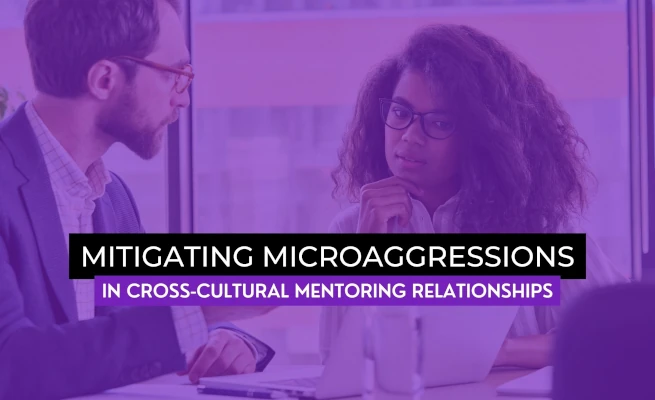Mitigating Microaggressions in Cross-Cultural Mentoring Relationships
Mentoring relationships are pivotal in fostering professional and personal growth. However, when these relationships exist between individuals from differing dimensions of diversity, they can inadvertently become situations where microaggressions occur. Microaggressions are subtle, often unintentional behaviors or comments that can significantly impact the dynamics of relationships. This is particularly true in mentoring relationships because they are often compounded by inherent power imbalances. This article delves into the types and impacts of microaggressions in cross-cultural mentoring relationships and explores strategies for mitigating these occurrences and responding to them when they occur.
Understanding Microaggressions in Mentoring
Microaggressions are everyday verbal, nonverbal, and environmental slights or insults, whether intentional or unintentional, that communicate hostile, derogatory, or negative messages. In mentoring, these can manifest in various forms and occur across various dimensions of diversity, including:
Racial Microaggressions: Comments or actions that subtly express racial prejudice or stereotype. For example: A person of color is frequently asked, “Where are you really from?” despite explaining they were born and raised in the same country as the person asking. This question subtly implies that they are perpetual foreigners in their own country due to their race.
Gender Microaggressions: Behaviors that reflect stereotypes or biased attitudes towards a person’s gender. For example: Referring to assertive behavior from female employees as “bossy” or “emotional,” while similar behavior from male employees is described as “confident” or “strong leadership.
Age-related Microaggressions: Remarks or actions that demean an individual based on their age. Junior employees not being included in strategic planning meetings with the assumption that they lack experience or valuable insights.
Cultural Microaggressions: Subtle discrimination against someone’s cultural background or identity. For example: An employee wearing traditional clothing from their cultural background is asked if they can wear “normal/professional clothes” for a work event. This subtly discriminates against and devalues their cultural identity and heritage and also suggests it is not professional.
These microaggressions can arise due to differences in race, gender, age, or other underrepresented categories. The power dynamics inherent in mentoring relationships can exacerbate these issues, leading to situations where mentors, and sometimes mentees, may unknowingly commit microaggressions.
The Impact of Microaggressions
The impact of microaggressions in mentoring relationships can be profound and multifaceted:
Psychological Distress: They can cause feelings of frustration and self-doubt in the recipient.
Erosion of Trust: Microaggressions can undermine the openness and trust that are essential for a successful mentoring relationship.
Professional Setbacks: For mentees, particularly from underrepresented groups, microaggressions can impede professional development and opportunities and may lead to attrition.
Cultural Isolation: They can reinforce feelings of being an outsider, affecting the mentee’s sense of belonging and engagement.
Recognizing that while some microaggressions are unintentional, their effects are real, harmful, and can perpetuate a cycle of exclusion and inequality.
Strategies for Mitigation
Pre-Relationship Training and Education
Providing comprehensive training and education for mentors, mentees, sponsors, and sponsees before matching is crucial. These trainings should focus on awareness of cultural differences, best practices for relationship building, recognizing, understanding, and responding to microaggressions, and developing empathy and active listening skills for inclusive and impactful communication.
Encouraging Self-Reflection
Both mentors and mentees should engage in regular self-reflection, examining personal biases and reflecting on interactions to identify any instances of microaggressions.
Creating Safe Spaces for Discussion
Establishing brave, less judgmental spaces where mentors and mentees can openly discuss challenges, including any experiences of microaggressions, is essential. These spaces should be supportive and regularly scheduled to maintain ongoing dialogues, ideally in cohorts separated by their respective roles.
Implementing Feedback Mechanisms
Effective Feedback mechanisms, such as anonymous feedback systems and regular check-ins, are essential for mentoring program administrators to be informed about the occurrence of microaggressions. Having this resource will also provide both mentors and mentees support in addressing microaggressions, and hopefully allow for the relationship to continue past any challenges.
Continuous Learning and Development
Mitigating microaggressions is an ongoing process. Continuous learning opportunities can help mentors and mentees stay informed and engaged and encourage inclusive and productive conversations since communication is a crucial aspect of their relationship.
Conclusion
Microaggressions occurring in cross-cultural mentoring relationships are challenges that can be effectively mitigated with the right strategies. By fostering an environment of understanding, open communication, and continuous learning, mentors and mentees can build more supportive, inclusive, and productive relationships. Creating an organizational culture that acknowledges and actively works to understand and embrace diversity, ensuring that all participants feel valued and respected, is essential for the success of any mentoring program. Let’s commit to recognizing and addressing microaggressions, paving the way for stronger relationships and more enriching and empowering mentoring experiences.
If you’re interested in training and education on mentoring, sponsorship, microaggressions, or inclusive communication for your organization, contact me for more information, I would love to collaborate with you!
All Rights Reserved PGE Consulting Group LLC Reprint permission requests to info@paulaedgar.com






